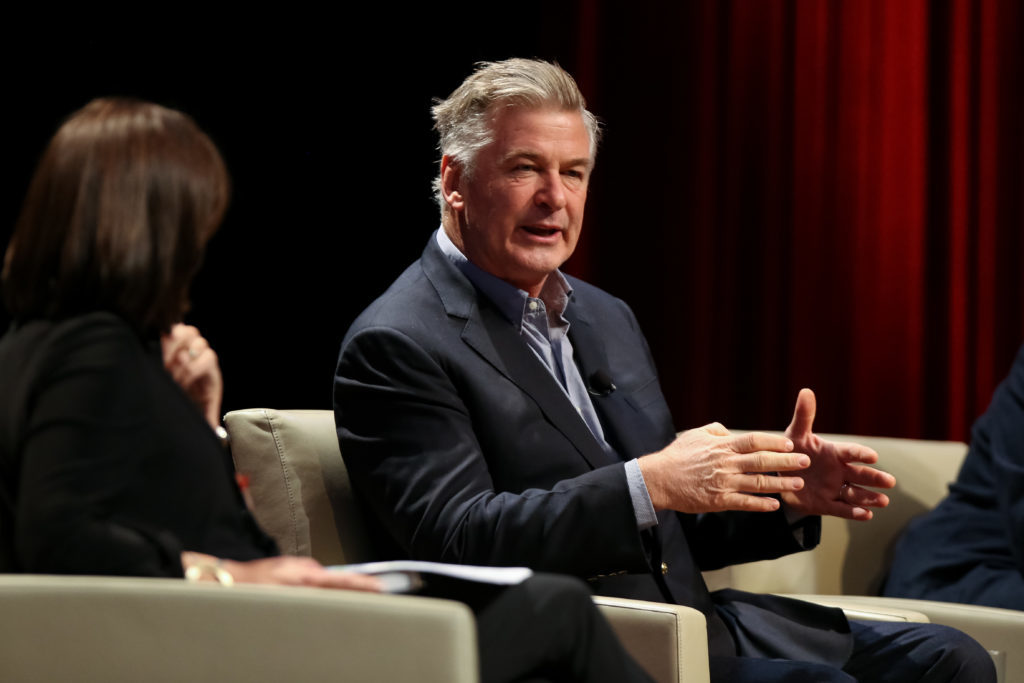Actor Alec Baldwin and author Kurt Andersen talked presidency, politics and impersonations at Lisner Auditorium Tuesday night.
The pair discussed their new book “You Can’t Spell America Without Me,” a satirical memoir of President Donald Trump’s first year in office. The book, released last week, is written in the voice of Baldwin’s famed Trump impersonation on “Saturday Night Live.”
The event was organized by Politics and Prose bookstore and moderated by store co-owner Lissa Muscatine. At one point during the event, Baldwin read a passage aloud from the book in full Trump persona. Then Andersen and Baldwin later talked in-depth about the origin of the novel and today’s political climate, answering audience questions towards the end.
Here are the night’s highlights:
1. Inspiration for the book
Baldwin began the conversation by sharing that he proposed the idea of a satirical Trump memoir in jest, but people were so excited about the idea that he sought a writing partner to make it happen.
“I knew I didn’t have the time to write a book like this, and I knew I didn’t have the ability to write a book like this,” Baldwin said. “Kurt was the only person that could do this.”
Andersen said his specialty isn’t typically political parody, but his vested interest in following the Trump administration drew him to collaborating with Baldwin on this book. Throughout the process of writing the book, they both became fluent in the president’s personal language – “Trump-ese.”
When asked by the moderator about the difference between portraying Trump on-screen and writing a satire from his point of view, Baldwin said the book’s humor is more intelligent and elaborate than the jokes he makes on screen.
“You may watch ‘SNL’ and think it’s the funniest thing ever, but many people don’t think there’s anything there for them,” Baldwin said. “When I come on and I’m doing this goofy crap that I’m doing, they click and change the channel. But this book is smart.”
2. Playing the president
Baldwin’s Trump impersonation has been a fixture on “SNL” since October 2016. Baldwin said when Lorne Michaels, the show’s executive producer, pitched Baldwin the idea, he wasn’t initially thrilled.
“He said to me, ‘Tina [Fey] and I had the idea that you would play Trump,’ and I think I spit my drink out,” Baldwin said. “Me playing Trump? That’s the most asinine thing I’ve ever heard.”
At the time, he said he underestimated the longevity of the character and thought he would only appear as Trump in a few episodes during peak election season in October and November of that year.
Now with Trump in the Oval Office, Baldwin said he is often the main focus of the show.
“Every week, Trump is the head writer on ‘SNL,’” he said.
3. Making politics personal
Baldwin, who has been an outspoken critic of Trump since before he was elected president, said during a more personal and serious portion of the conversation that he expected Trump’s aggressive and eccentric persona to mellow out once he actually entered office.
“I thought to myself my God, he’ll finally come to his sense and say ‘what a tremendous opportunity this is.’ Forget about it,” Baldwin said.
Even though their novel is a falsified account of Trump’s initial year as commander-in-chief, Andersen described their fictional work as “plausible in a terrifying way.” During the writing process, the author said there were headlines that were strikingly similar to the fictional events he had conjured up for the book.
Both Andersen and Baldwin concurred that their mockery of the president was part of a greater coping mechanism for Americans who are disheartened by the current political climate.
“We couldn’t be mean enough to this guy,” Baldwin said.




